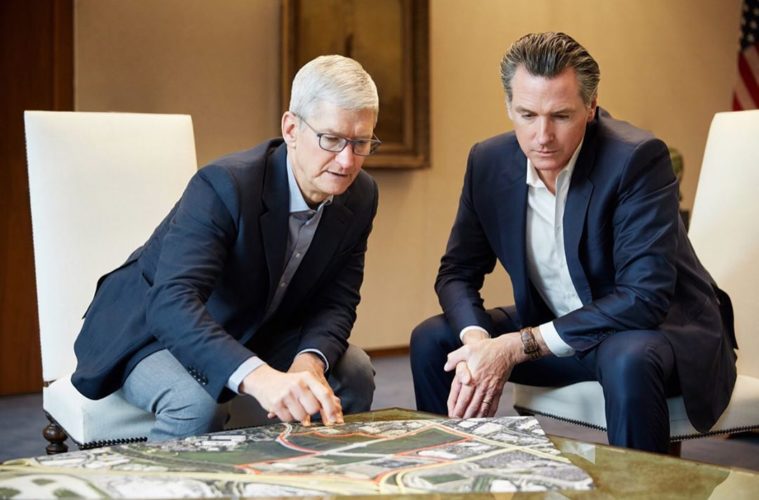Governor Gavin Newsom announced Friday the creation of a new Task Force on Business and Jobs Recovery meant to aid in reopening California and ensuring the state’s economic stability. Comprised of state leaders in labor, health care and the business community, the Task Force will work together to strategize short and long-term solutions for business and job recovery.
“I am honored that dozens of leaders in business, labor, health and philanthropy are stepping up to meet this moment by committing their time and talent to lift up all Californians,” Newsom said. “Through their leadership, and the leadership of California’s 40 million residents, I have no doubt we will emerge stronger from this crisis.”
Emile Haddad, the Chairman and CEO of FivePoint Communities, was one of the individuals invited to be a part of the group organized to aid in California’s recovery from the COVID-19-induced recession. Haddad accepted Newsom’s invitation, telling us he is eager to do whatever he can to help in developing options that help California’s communities.
“Anything I can do to help,” says Haddad.
Calling the development of the Task Force a “very smart and responsible move” by the governor, Haddad acknowledged that Californians are currently afloat in uncharted waters, an issue that the recovery team will have to adapt to as it evolves.
“We have to go into it with open-mindedness and a lot of flexibility because we are going to have to adjust in real-time based on what the data is telling us,” explains Haddad. “No one is going to be able to unilaterally turn the ship, this is going to be a group effort where everybody adds incremental value.”
Appointees to the group come from all over the state and represent a broad cross-section of backgrounds. From the business community Haddad is joined by Apple CEO Tim Cook, Chipotle CEO Brian Niccol and Bob Iger, the executive chairman of the Walt Disney Company, among others; the labor community is represented by Mary Kay Henry, President of SEIU; Doug McCarron, President of the United Brotherhood of Carpenters and E. Toby Boyd, president of the California Teachers Association, to name a few; and political representation includes Anthony Rendon, Speaker of the California State Assembly, Tony Atkins, President pro Tempore of the State Senate, Shannon Grove, Minority Leader of the State Senate and Marie Waldron, Minority Leader of the State Assembly. The co-chairs of the effort are former presidential candidate, businessman and activist, Tom Steyer and Ann O’Leary, the governor’s chief of staff. The full list of members can be found here.
“In the coming weeks and months, we will bring together the public and private sectors, outside experts, organized labor, environmental groups, and activists to develop recommendations for a recovery plan that works for all Californians, with an emphasis on those communities hardest hit by the pandemic,” according to Steyer. “Our goal is to present Governor Newsom with tangible actions that leverage the task force’s expertise to rebuild California, emphasize smart, green technologies and provide a model for just economic development for our country.”
While talks of reopening are promising, the effects will not be immediate.
“We should not be assuming that this is going to be like, ‘let’s just ring the bell and everyone just goes back to class.’ This is going to be a very systematic, phased and thought-through process for us to start reopening the economy without putting people’s health at risk,” shares Haddad.
“I think that if the numbers keep on trending in the right direction in the coming couple of weeks, that maybe by the first or second week of May we will start seeing the beginning of what could start being open,” Haddad hopes. “I think that there has to be a lot of things that have to be thought through and put in place before we do that.”

(Emile Haddad)
Newsom’s recently unveiled six-part plan to reopen the economy includes increased testing availability, the ability to trace the virus, and enhanced social distancing measures that allow for certain businesses to begin operating again.
“All Californians depend on our state’s economy. This public health crisis has battered it, and going forward nothing will be more important than acting to restore our businesses and our jobs. This team of influential leaders should help point the state in the right economic direction, while we continue working to control the pandemic,” says Speaker Rendon.
When it comes to preserving the health of the people along with the health of their finances and the state’s economy, the Task Force will have a lot to consider. COVID-19 has hit California’s economy hard, with more than 2.8 million unemployment claims filed since March 12, 2020.
Haddad provided us with some insights as to what must be discussed, saying, “the rest of the world is balancing the health of the economy with the health of people as to how to open and when to open. We also have to balance something that the rest of the world might not be as sensitive to and that is the constitutional right for privacy.”
While many countries are seeing success with mandatory tracking and medical record disclosure, America does not demand the same involuntary actions of its people. Because we don’t have a culture of that kind of loss of liberty in this country, the Task Force will have to consider how to embolden communities to come together and help each other stay safe through voluntary testing and tracking.
As a whole, Haddad hopes that the working group will provide the solutions Californians need.
“I’m always a strong believer that in situations like this, if you focus on taking care of the weakest link, the people who need help the most, then you speed up the recovery, in a meaningful and lasting way,” he shares. “The strongest support the weakest. If we can think about things that way, I think that we are going to be able to go through this with the least amount of casualties, both economic and otherwise.”
The task force will be meeting twice a month throughout 2020.
Advertising disclosure: We may receive compensation for some of the links in our stories. Thank you for supporting LA Weekly and our advertisers.

